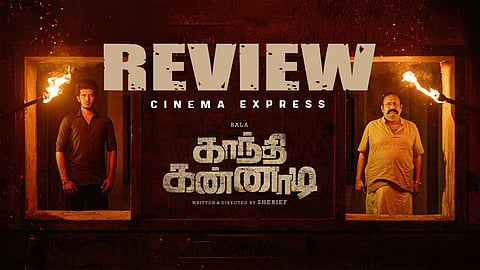Gandhi Kannadi Movie Review: Confused storytelling shatters this soulful drama
Gandhi Kannadi(2.5 / 5)
Gandhi Kannadi Movie Review:
There are so many joys to cherish in Sherief’s Gandhi Kannadi that rests predominantly on the shoulders of Gandhi (Balaji Sakthivel) and Kannamma (Archana), a couple in their autumn of life who are living in borderline penury. Yet, they have deep contentment from the love they possess for each other. Gandhi is someone whom the Gen-Z crowd will loudly call as ‘pookie’. Kannamma is the chalk to his cheesy words. Everyday, she would bring a handful of salt and chillies to ward off ‘evil eyes’ and he would listen kindly to her advice on safety instructions while riding a scooter like it was just yesterday. It’s been a while since Tamil cinema saw an enduring full-length December-December love story of this sort, and director Sherief paints this with yearning eyes, almost like asking, ‘Will new-age love even survive this long?’
Kathir (Bala) and Geetha’s (Namita Krishnamurthy) romance on the other hand, has no-fuss introductions, awkward first moves or squabbles of any sort. Their romance is mature, self-reflective and progressive. But it is when these two storylines clash that the film loses track of where it was supposed to lead its viewers to.
Cast: Bala, Balaji Sakthivel, Namita Krishnamurthy, Urvashi Archana, Amudhavanan, Madhan and Nikhila Sankar
Director: Sherief
Kathir, who runs an event management agency, meets Gandhi, an ageing security guard, who wants to fulfil Kannamma’s dream of having a 60th wedding function in the most lavish way possible. When Kathir’s estimates don’t match his funds, he chooses to give away the properties in his name, but tragedy strikes in the form of a government order. Straight up, Sherief invests you in Gandhi’s story despite Kathir’s narrative hanging in loose threads. Some films might choose to go down the easy path of a son-adopting-father angle, but Gandhi Kannadi doesn’t believe in such antics. Kathir is profit-oriented and avaricious. He looks at Gandhi through a mere client-customer lens and is indifferent to his emotions.
It is here that Balaji Sakthivel truly shines, proving his mettle as an actor who can mirror, reflect and distort a picture through his skills. His child-like expressions, undying love for his wife and naivety in choosing materialistic desires make him a character that one wholeheartedly roots for. The same writing does not quite match up for Bala’s character. A script screaming with potential for exploring varied emotions is left uneven and haphazard. Through the latter half, as the protagonists scramble to pull their lives together, the writing succumbs to the curse of the second half, driving into alleyways of forced humour and sometimes losing the value of what it genuinely stands for.
While it does truthfully depict the struggles of the working class, Gandhi Kannadi never truly harbours the strength it possesses in showing the parallels of love amid changing times. That would have been a story to tell for a lifetime. Unlike Gandhi and Kannamma who experience a multitude of growth and changes, Kathir and Geetha’s conflicts are never resolved until the end. Instead, the team moves around in circles, trying to make a stance politically, and the perils surrounding it—justifying neither of these angles.
My angst also stems from the makers building a towering screenplay replete with all the right elements and smashing it themselves with unnecessary death-baiting. While you are seated for these dramas, worries are bound to creep in, expecting a major character’s demise. Although that isn’t the predominant concern, it becomes one only when the makers pull it as a final trick to make the audiences well up in sadness, clouding every other emotion about the film. Why can’t a character survive to tell the story? Why is there always a need to insert an overwhelmingly sentimental tragedy for the protagonist’s realisation? There are moments of delightful confrontations that highlight the importance of merely appreciating a partner’s presence. For example, when Gandhi calls Kannamma every day, appreciating her cooking, even though it’s a simple meal, and later defending their love for each other.
Or when Bala and Geetha agree on the value of money in relationships and marital life. It's realistic, simple and effective. But in an overload of emotional and rushed messaging, Gandhi Kannadi seems confused on what it wants to be and say. The film is also mounted on Bala, who rose to fame with the comedy show Kalakka Povathu Yaaru. In fact, the film is a shadow promotion for him as he is also known for his altruism and philanthropy. What ultimately shatters is the film's inability to complete Gandhi and Kathir's arcs as they could have learnt from each other on what constitutes love's longevity in a relationship. That is the film that I would voluntarily remove my glasses for and cry.

